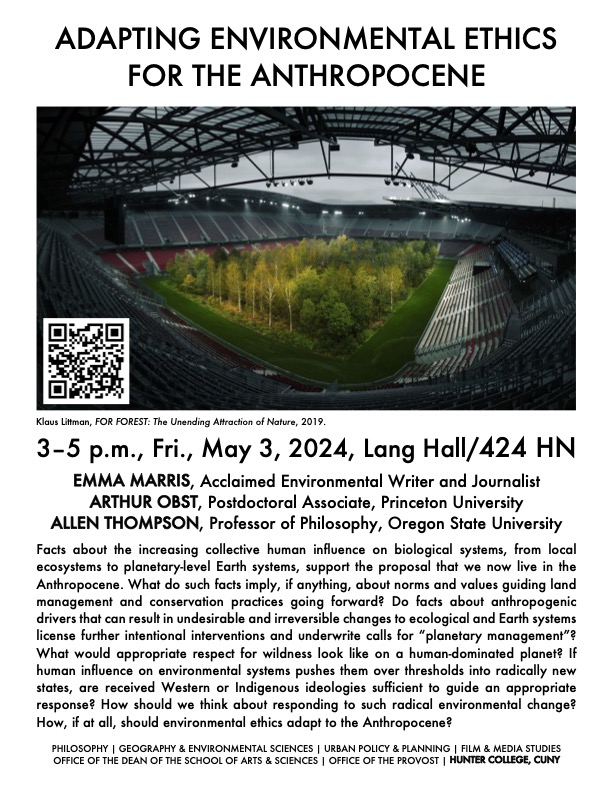Various programmes and results in the philosophy/foundations of spacetime theories illustrate themes from reductionism and functionalism in general philosophy of science. I will focus on some programmes and results about how the physics of matter contributes to determining, or even determines, or even explains, chrono-geometry. I hope to say something about most of the following examples: in the philosophical literature, Robb (1914), and Mundy (1983); and in the physics literature: Barbour and Bertotti (1982); Hojman, Kuchar and Teitelboim (1976); Dull, Schuller et al. (2012, 2018); and Gomes & Shyam (2016).
Presented by Metro Area Philosophers of Science
===============================================================
Armin Schulz (University of Kansas)
Details: 4:30-6:30pm Wednesday Oct 9; 3rd floor seminar room, 5 Washington Place (NYU).
Title: TBD.
Abstract: TBD.
===============================================================
Christopher Weaver (University of Illinois)
Details: 4:30-6:30pm Wednesday Nov 13; 3rd floor seminar room, 5 Washington Place (NYU).
Title: TBD.
Abstract: TBD.
I will argue, pace a great many of my contemporaries, that there’s something right about Boltzmann’s attempt to ground the 2nd law of thermodynamics in deterministic time-reversal invariant classical dynamics, and that in order to appreciate what’s right about (what was at least at one time) Boltzmann’s explanatory project one has to fully apprehend the nature of (a) microphysical causal structure, (b) time-reversal invariance, and (c) the relationship between Boltzmann entropy and the work of Rudolf Clausius.
There will be dinner after the talk. If you are interested, please send an email with “Dinner” in the heading to nyphilsci@gmail.com (please note that all are welcome, but only the speaker’s dinner will be covered.) If you have any other questions, please email denise.dykstra@rutgers.edu.
David Albert’s work has been of seminal importance to the foundations of physics, exerting central influence on the direction the field and laying foundations for much of its ongoing development. In celebration of David’s many past and continuing contributions, we will be hosting a conference at Columbia University on the foundations of physics. We expect talks on a range of topics, including the foundations of quantum mechanics and statistical mechanics, the possible emergence of space and time, the metaphysics of science, and the nature of agency.
Confirmed Speakers
Jeff Barrett (UC Irvine)
Gordon Belot (Michigan)
Craig Callender (UC San Diego)
Sean Carroll (Caltech)
Eddy Chen (UC San Diego)
Sidney Felder (Rutgers)
Alison Fernandes (Dublin)
Shelly Goldstein (Rutgers)
Ned Hall (Harvard)
Barry Loewer (Rutgers)
Tim Maudlin (NYU)
Michael Miller (Toronto)
Alyssa Ney (UC Davis)
Lev Vaidman (Tel Aviv)
David Wallace (Pittsburgh)
Nino Zanghi (Genoa)
Organizing Committee
Alison Fernandes (alison.fernandes@tcd.ie)
Michael Miller (mike.miller@utoronto.ca)
Porter Williams (porterwi@usc.edu)
.
The conference is open to the public. Please direct any questions to Porter Williams (porterwi@usc.edu).
Friday, November 15
8:45 am: Breakfast
9:30 am: Jeff Barrett (UC Irvine): Quantum Randomness and Empirical Underdetermination
10:15 am: Shelly Goldstein (Rutgers): Typicality, Humean Probability, and the Mentaculus
11:00: Coffee Break
11:20 am: Craig Callender (UC San Diego): No Time for Time from No-Time
12:05 pm: Alyssa Ney (UC Davis): WFR or QFT?
12:50: Lunch
2:20 pm: Gordon Belot (Michigan): The Mach-Einstein Principle of 1917-1918
3:05 pm: Sean Carroll (Caltech): The Mentaculus as a Causal Network
3:50: Coffee Break
4:10 pm: David Wallace (Pittsburgh): TBA
4:55 pm: Ned Hall (Harvard): Respectful Deflationism
5:45 pm: Adjourn
Saturday, November 16
8:45 am: Breakfast
9:30 am: Lev Vaidman (Tel Aviv): The many-worlds interpretation and the Born rule
10:15 am: Eddy Chen (UC San Diego): Nomic Vagueness
11:00: Coffee Break
11:20 am: Michael Miller (Toronto): Infrared Cancellation and Measurement
12:05 pm: Alison Fernandes (Trinity College Dublin): The Direction of Records
12:50: Lunch
2:20 pm: Sidney Felder (Rutgers): Gödel’s Rotating Solutions, Bilking, and Natural Laws
3:05 pm: Nino Zanghi (INFN Genova): TBA
3:50: Coffee Break
4:10 pm: Tim Maudlin (NYU): S = k ln(B(W)): Boltzmann entropy, the Second Law, and the Architecture of Hell
4:55 pm: Barry Loewer (Rutgers): The Consequence Argument Meets the Mentaculus
5:45 pm: Adjourn
Presented by Metro Area Philosophers of Science
Spring 2020 Schedule:
Anthony Aguirre (UCSC) – “Entropy in long-lived genuinely closed quantum systems”
6:30-8:30pm Tuesday Feb 4; NYU Philosophy Department (5 Washington Place), 3rd floor seminar room.
David Papineau (King’s College London & CUNY) – “The Nature of Representation”
4:30-6:30pm Tuesday March 3; CUNY Graduate Center (365 5th Ave, NYC), room 5307.
Jim Holt (Author of Why Does the World Exist?) – “Here, Now, Photon: Why Newton was closer to EM than Maudlin is”
4:30-6:30pm Tuesday April 7; CUNY Graduate Center (365 5th Ave, NYC), room 5307.
Deborah Mayo (Virginia Tech)
4:30-6:30pm Tuesday April 28; CUNY Graduate Center (365 5th Ave, NYC), room 5307.
Facts about the increasing collective human influence on biological systems, from local ecosystems to planetary-level Earth systems, support the proposal that we now live in the Anthropocene. What do such facts imply, if anything, about norms and values guiding land management and conservation practices going forward? Do facts about anthropogenic drivers that can result in undesirable and irreversible changes to ecological and Earth systems license further intentional interventions and underwrite calls for “planetary management”? What would appropriate respect for wildness look like on a human-dominated planet? If human influence on environmental systems pushes them over thresholds into radically new states, are received Western or Indigenous ideologies sufficient to guide an appropriate response? How should we think about responding to such radical environmental change? How, if at all, should environmental ethics adapt to the Anthropocene?
